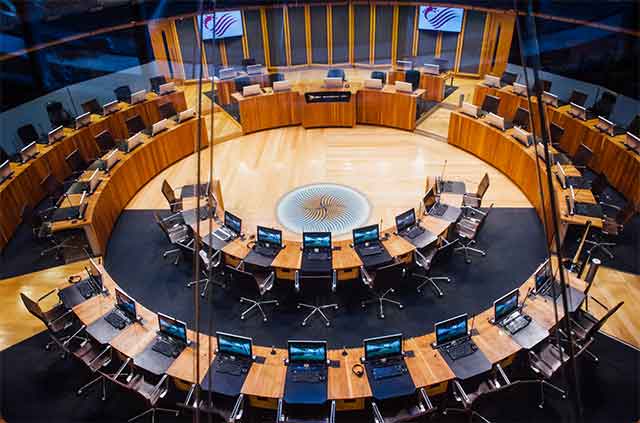MSs scrutinised Wales’ finance minister after the Welsh Government announced a raft of cuts to spending on public services.
Rebecca Evans appeared before the Senedd’s finance committee to give evidence on Welsh ministers’ 2024/25 spending plans.
Peredur Owen Griffiths, the Plaid Cymru MS, who chairs the committee, asked about the winners and losers in the draft budget.
Ms Evans stressed that the budget is worth £1.3bn less than when it was set in the UK Government’s 2021 spending review.
She said: “We know the NHS and frontline core public services are the top priorities for people in Wales and we wanted to reflect that.”
Ms Evans told members that an additional £450m has been provided for the NHS but she warned that it will not entirely meet existing pressures.
Rural affairs
Ms Evans said ministers have protected the basic payment scheme, which supports farmers and is worth more than £200m, despite the largest cuts falling on the rural affairs portfolio.
“It did mean, though, some other difficult choices for the rural affairs minister, so she will be releasing £40m from the rural investment scheme,” she told MSs.
“She also had to release funding in relation to the promotion of Welsh food and drink.”
Mike Hedges questioned why the basic payment scheme received priority over issues affecting people from poorer backgrounds.
The Labour MS pointed out that other areas, such as rail and enterprise zones, are protected, asking how the Welsh Government comes to such decisions.
Ms Evans said ministers’ priorities included protecting frontline public services, delivering the greatest benefit to households hardest hit by the cost of living, and prioritising jobs.
Consequentials
Asked by Labour’s Rhianon Passmore about the HS2 railway project, Ms Evans told the committee the Welsh Government has not received any consequential funding so far.
She said: “Given the changes to plans for the programme, it is clearly now not a Wales and England project – it’s a purely England project.
“We have already lost £260m in consequentials that should have come to Wales and there’s no indication at the moment that the UK Government has any intention of providing that.”
Laura Anne Jones said the UK Government is increasing spending on public services with an extra £8bn for health and social care as well as £2bn for schools in 2024/25.
The Conservative MS pointed out that this will trigger more funding for the Welsh Government, with Wales receiving £1.20 for every £1 spent in England.
She questioned spending on plans to expand the size of the Welsh Parliament.
‘Red herring’
Ms Evans described that as a red herring because only a small proportion of the budget, £1m, has been allocated to Senedd reform next year.
She explained that Wales received £165m from the UK autumn statement.
She said: “The NHS budget in England next year is due to rise by less than 1% whereas because of the choices we’ve made, the Welsh NHS budget will rise by at least 4%.
“I think that shows a different level of priority that we have on public services.”
Ms Evans warned that health boards in Wales will still face difficult decisions and spending has been reprioritised within the wider health portfolio.
The minister said funding has been released from the digital strategy for health and social care, research and innovation, and education and training.
Ms Evans added that this will mean a reduction in the number of training places next year.
Councils
On local government, she said the Welsh Government has kept its promise of a 3.1% uplift but she warned that councils are going to face difficult decisions.
Ms Evans added that the £166m housing support grant has been protected, as has the £38m discretionary assistance fund.
Pressed about Labour’s 2021 election manifesto commitment of paying social care workers the real living wage, she said no funding is available to meet the pledge this year.
She said councils are being given more flexibility with the number of education grants, falling from more than 20 to four focused on standards, equity, reform and the Welsh language.
Ms Evans recognised criticism that the spending plans were published during recess but she explained that the Welsh Government only found out its budget on November 22.
She told the meeting on December 20: “We would love to do it earlier but three-and-a-half weeks is, I think, the absolute bare minimum that we need to be able to craft a budget.”
Ms Evans described the UK Treasury as hostile to devolution, saying she is confident a Labour-led UK Government would take a different approach to borrowing and reserves.
She agreed with Mike Hedges that councils in Wales are afforded more flexibility in managing their budgets than the Welsh Government.
Taxes
Mr Evans said there has been no progress on implementing a vacant land tax due to Westminster pushing back on devolving the necessary powers.
Highlighting the 2023 tax policy report, Ms Evans pointed to progress on reforming council tax and business rates as well as introducing a tourism tax.
Pressed about concerns that small businesses will pay more tax in Wales than England, she said the 75% relief for retail, hospitality and leisure will be set at 40% next year.
Ms Evans said it was only intended to be a short-term relief in response to the pandemic and the change released £75m for reprioritisation.
She stressed that half of businesses pay no rates due to the £385m a year spent on relief.
Asked about funding for national cultural institutions, such as the National Library, Museum Wales and Sport Wales, she acknowledged that many have seen cuts of more than 10%.
On Brexit, she said Wales has lost £1.1bn of EU structural and rural funds and warned: “There’s just no way on earth we can fill that gap.”
A Senedd debate on the draft budget will be held on January 9, with a vote in early March.

